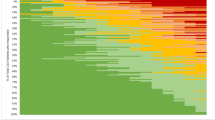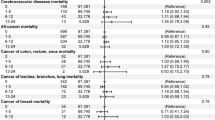Abstract
Aims/hypothesis
The aim of this study was to examine the association between psychological distress and the risk of cardiovascular disease (CVD) events and all-cause mortality in patients with screen-detected type 2 diabetes mellitus. In addition, we explored whether or not metabolic control and medication adherence could explain part of this association.
Methods
A follow-up study was performed including 1,533 patients aged 40–69 years with screen-detected type 2 diabetes mellitus identified in general practice during 2001–2006 in the Denmark arm of the ADDITION (Anglo–Danish–Dutch Study of Intensive Treatment in People with Screen-Detected Diabetes in Primary Care) study. Mental health was measured at baseline with the Mental Health Inventory 5 (MHI-5). Psychological distress was defined as an MHI-5 score of ≤68 (18.2% of the population). CVD risk factors were measured at baseline and repeated at the follow-up examination. Information on death, hospital discharge diagnosis, and antihypertensive and lipid-lowering drug treatment was obtained from national registers. Cox proportional regression was used to estimate HRs for the association between psychological distress, CVD events and all-cause mortality. Age- and sex-adjusted risk difference analyses were performed to estimate differences in meeting treatment targets.
Results
Patients with psychological distress had a 1.8-fold higher mortality rate (HR 1.76, 95% CI 1.23, 2.53) and a 1.7-fold higher risk of having a CVD event (HR: 1.69, 95% CI 1.05, 2.70) compared with those with an MHI-5 score of >68. Overall, psychological distress was not associated with the ability to meet treatment targets for HbA1c levels, cholesterol levels or BP, or to redeem antihypertensive or lipid-lowering drug treatment.
Conclusions/interpretation
In people detected and treated early in the diabetes disease trajectory, those with psychological distress at the time of diagnosis had a higher risk of CVD events and death than those without psychological distress.
Similar content being viewed by others
Abbreviations
- ACCORD:
-
Action to Control Cardiovascular Risk in Diabetes
- ADDITION:
-
Anglo–Danish–Dutch Study of Intensive Treatment in People with Screen-Detected Diabetes in Primary Care
- CVD:
-
Cardiovascular disease
- GHQ-12:
-
General Health Questionnaire 12
- MET:
-
Metabolic equivalent value
- MHI-5:
-
Mental Health Inventory 5
References
Ali S, Stone MA, Peters JL, Davies MJ, Khunti K (2006) The prevalence of co-morbid depression in adults with Type 2 diabetes: a systematic review and meta-analysis. Diabet Med 23:1165–1173
Pouwer F, Geelhoed-Duijvestijn PH, Tack CJ et al (2010) Prevalence of comorbid depression is high in out-patients with type 1 or type 2 diabetes mellitus. Results from three out-patient clinics in the Netherlands. Diabet Med 27:217–224
Smith KJ, Beland M, Clyde M et al (2013) Association of diabetes with anxiety: a systematic review and meta-analysis. J Psychosom Res 74:89–99
Lustman PJ, Anderson RJ, Freedland KE, de Groot M, Carney RM, Clouse RE (2000) Depression and poor glycemic control: a meta-analytic review of the literature. Diabetes Care 23:934–942
Pouwer F, Nefs G, Nouwen A (2013) Adverse effects of depression on glycemic control and health outcomes in people with diabetes: a review. Endocrinol Metab Clin N Am 42:529–544
Park M, Katon WJ, Wolf FM (2013) Depression and risk of mortality in individuals with diabetes: a meta-analysis and systematic review. Gen Hosp Psychiatry 35:217–225. doi:10.1016/j.genhosppsych.2013.01.006
Lin EH, Heckbert SR, Rutter CM et al (2009) Depression and increased mortality in diabetes: unexpected causes of death. Ann Fam Med 7:414–421
van Dooren FE, Nefs G, Schram MT, Verhey FR, Denollet J, Pouwer F (2013) Depression and risk of mortality in people with diabetes mellitus: a systematic review and meta-analysis. PLoS One 8:e57058
Hamer M, Stamatakis E, Kivimaki M, Pascal Kengne A, Batty GD (2010) Psychological distress, glycated hemoglobin, and mortality in adults with and without diabetes. Psychosom Med 72:882–886
Russ TC, Stamatakis E, Hamer M, Starr JM, Kivimaki M, Batty GD (2012) Association between psychological distress and mortality: individual participant pooled analysis of 10 prospective cohort studies. BMJ 345:e4933
de Jonge P, Rosmalen JG, Kema IP et al (2010) Psychophysiological biomarkers explaining the association between depression and prognosis in coronary artery patients: a critical review of the literature. Neurosci Biobehav Rev 35:84–90
Meijer A, Zuidersma M, de Jonge P (2013) Depression as a non-causal variable risk marker in coronary heart disease. BMC Med 11:130. doi:10.1186/1741-7015-11-130
Lauritzen T, Griffin S, Borch-Johnsen K et al (2000) The ADDITION study: proposed trial of the cost-effectiveness of an intensive multifactorial intervention on morbidity and mortality among people with Type 2 diabetes detected by screening. Int J Obes Relat Metab Disord 24(Suppl 3):S6–S11
Griffin SJ, Borch-Johnsen K, Davies MJ et al (2011) Effect of early intensive multifactorial therapy on 5-year cardiovascular outcomes in individuals with type 2 diabetes detected by screening (ADDITION-Europe): a cluster-randomised trial. Lancet 378:156–167
Sandbaek A, Griffin SJ, Rutten G et al (2008) Stepwise screening for diabetes identifies people with high but modifiable coronary heart disease risk. The ADDITION study. Diabetologia 51:1127–1134
Spijkerman AM, Adriaanse MC, Dekker JM et al (2002) Diabetic patients detected by population-based stepwise screening already have a diabetic cardiovascular risk profile. Diabetes Care 25:1784–1789
Bek T, Lund-Andersen H, Hansen AB, Johnsen KB, Sandbaek A, Lauritzen T (2008) The prevalence of diabetic retinopathy in patients with screen-detected type 2 diabetes in Denmark: the ADDITION study. Acta Ophthalmol 87:270–274. doi:10.1111/j.1755-3768.2008.01207.x
Christensen JO, Sandbaek A, Lauritzen T, Borch-Johnsen K (2004) Population-based stepwise screening for unrecognised type 2 diabetes is ineffective in general practice despite reliable algorithms. Diabetologia 47:1566–1573
Alberti KG, Zimmet PZ (1998) Definition, diagnosis and classification of diabetes mellitus and its complications. Part 1: diagnosis and classification of diabetes mellitus provisional report of a WHO consultation. Diabet Med 15:539–553
Ware JE Jr, Sherbourne CD (1992) The MOS 36-item short-form health survey (SF-36). I. Conceptual framework and item selection. Med Care 30:473–483
Ware JE Jr, Gandek B (1998) Overview of the SF-36 Health Survey and the International Quality of Life Assessment (IQOLA) Project. J Clin Epidemiol 51:903–912
McHorney CA, Ware JE Jr (1995) Construction and validation of an alternate form general mental health scale for the Medical Outcomes Study Short-Form 36-Item Health Survey. Med Care 33:15–28
Berwick DM, Murphy JM, Goldman PA, Ware JE Jr, Barsky AJ, Weinstein MC (1991) Performance of a five-item mental health screening test. Med Care 29:169–176
Kelly MJ, Dunstan FD, Lloyd K, Fone DL (2008) Evaluating cutpoints for the MHI-5 and MCS using the GHQ-12: a comparison of five different methods. BMC Psychiatry 8:10. doi:10.1186/1471-244X-8-10
Rumpf HJ, Meyer C, Hapke U, John U (2001) Screening for mental health: validity of the MHI-5 using DSM-IV Axis I psychiatric disorders as gold standard. Psychiatry Res 105:243–253
Pedersen CB (2011) The Danish Civil Registration System. Scand J Public Health 39:22–25
IDA - en integreret database for arbejdsmarkedsforskning, Hovedrapport [IDA - an integrated database of labor marked research], Danmarks Statistik [article online], 1991. Available from http://www.dst.dk/en/Statistik/dokumentation/Declarations.aspx. Accessed 13 February 2013 (archived)
Lynge E, Sandegaard JL, Rebolj M (2011) The Danish National Patient Register. Scand J Public Health 39:30–33
Kildemoes HW, Sorensen HT, Hallas J (2011) The Danish National Prescription Registry. Scand J Public Health 39:38–41
Charlson ME, Pompei P, Ales KL, MacKenzie CR (1987) A new method of classifying prognostic comorbidity in longitudinal studies: development and validation. J Chronic Dis 40:373–383
Dalsgaard EM (2009) Socioeconomic factors related to attendance in a type 2 diabetes screening programme, Addition DK. Diabet Med 26:518–525
Adriaanse MC, Dekker JM, Spijkerman AM et al (2005) Diabetes-related symptoms and negative mood in participants of a targeted population-screening program for type 2 diabetes: the Hoorn screening study. Qual Life Res 14:1501–1509
Park P, Simmons RK, Prevost AT, Griffin SJ (2008) Screening for type 2 diabetes is feasible, acceptable, but associated with increased short-term anxiety: a randomised controlled trial in British general practice. BMC Public Health 8:350. doi:10.1186/1471-2458-8-350
Arroyo C, Hu FB, Ryan LM et al (2004) Depressive symptoms and risk of type 2 diabetes in women. Diabetes Care 27:129–133
Pan A, Lucas M, Sun Q et al (2011) Increased mortality risk in women with depression and diabetes mellitus. Arch Gen Psychiatry 68:42–50
Pan A, Lucas M, Sun Q et al (2010) Bidirectional association between depression and type 2 diabetes mellitus in women. Arch Intern Med 170:1884–1891
Surtees PG, Wainwright NW, Luben RN, Wareham NJ, Bingham SA, Khaw KT (2008) Psychological distress, major depressive disorder, and risk of stroke. Neurology 70:788–794
Lauritzen T, Sandbaek A, Carlsen AH, Borch-Johnsen K (2012) All-cause mortality and pharmacological treatment intensity following a high risk screening program for diabetes. A 6.6 year follow-up of the ADDITION study, Denmark. Prim Care Diabetes 6:193–200
Simmons RK, Echouffo-Tcheugui JB, Sharp SJ et al (2012) Screening for type 2 diabetes and population mortality over 10 years (ADDITION-Cambridge): a cluster-randomised controlled trial. Lancet 380:1741–1748
Sullivan MD, O'Connor P, Feeney P et al (2012) Depression predicts all-cause mortality: epidemiological evaluation from the ACCORD HRQL substudy. Diabetes Care 35:1708–1715
Abi Khalil C, Roussel R, Mohammedi K, Danchin N, Marre M (2012) Cause-specific mortality in diabetes: recent changes in trend mortality. Eur J Prev Cardiol 19:374–381
Gonzalez JS, Peyrot M, McCarl LA et al (2008) Depression and diabetes treatment nonadherence: a meta-analysis. Diabetes Care 31:2398–2403
Katon W, Russo J, Lin EH et al (2009) Diabetes and poor disease control: is comorbid depression associated with poor medication adherence or lack of treatment intensification? Psychosom Med 71:965–972
Lustman PJ, Clouse RE (2005) Depression in diabetic patients: the relationship between mood and glycemic control. J Diabetes Complicat 19:113–122
Hamer M, Molloy GJ, Stamatakis E (2008) Psychological distress as a risk factor for cardiovascular events: pathophysiological and behavioral mechanisms. J Am Coll Cardiol 52:2156–2162
Funding
ADDITION-Denmark was supported by the National Health Services in the counties of Copenhagen, Aarhus, Ringkøbing, Ribe and South Jutland in Denmark, The Danish Council for Strategic Research, the Danish Research Foundation for General Practice, Novo Nordisk Foundation, the Danish Centre for Evaluation and Health Technology Assessment, the Danish Fund of the National Board of Health, the Danish Medical Research Council, and the Aarhus University Research Foundation. The trial has been given unrestricted grants from Novo Nordisk AS, Novo Nordisk Scandinavia AB, Novo Nordisk UK, ASTRA Denmark, Pfizer Denmark, Glaxo SmithKline Pharma Denmark, Servier Denmark A/S and HemoCue Denmark A/S. Parts of the grants from Novo Nordisk Foundation and Novo Nordisk were transferred to the other centres.
Duality of interest
KBJ holds shares in Novo Nordisk A/S and has been an invited speaker with honorarium paid by Eli Lilly, Novo Nordisk, Takeda and Sanofi-Aventis within the past 5 years. TL holds shares in Novo Nordisk A/S and has given five lectures for the medical industry within the past 2 years. DW holds shares in Novo Nordisk A/S. MV is supported by an unrestricted grant from the Lundbeck Foundation. All other authors declare that there is no duality of interest associated with their contribution to this manuscript.
Contribution statement
EMD, AS, MV, MVS, TL, DW, HTM and KBJ contributed to the design of the study and participated in the interpretation of data; EMD drafted the paper and all authors revised it critically. The final version was approved by all authors.
Author information
Authors and Affiliations
Corresponding author
Electronic supplementary material
Below is the link to the electronic supplementary material.
ESM Table 1
(PDF 31 kb)
Rights and permissions
About this article
Cite this article
Dalsgaard, EM., Vestergaard, M., Skriver, M.V. et al. Psychological distress, cardiovascular complications and mortality among people with screen-detected type 2 diabetes: follow-up of the ADDITION-Denmark trial. Diabetologia 57, 710–717 (2014). https://doi.org/10.1007/s00125-014-3165-4
Received:
Accepted:
Published:
Issue Date:
DOI: https://doi.org/10.1007/s00125-014-3165-4




